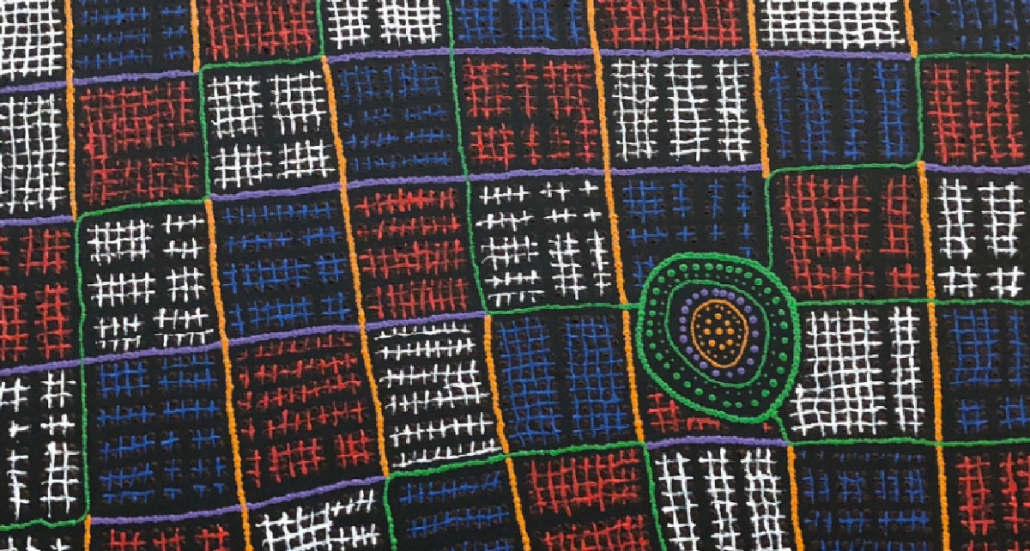Image: ‘From the Depths, Life Rises’ (detail) by Glenn Loughrey.
‘A thorny crown’
Andrew Collis
Reign of Christ, Year A
Psalm 100; Ephesians 1:15-23; Matthew 25:31-46
The icon by Kelly Latimore shows Christ framed/enthroned by the four evangelists. Some theologians suggest that the scriptures, the gospels in particular, re-present, or stand in for, Christ.

Today’s gospel presents Christ in relation to the six-fold works of mercy: a “destitute king” who feeds (there is enough food and drink, of course, we just need for it to be blessed, broken and given freely and fairly); a “divinanimal” who welcomes, clothes, comforts and visits …
The text is also like Jesus in its vulnerability. The marks of a thorny crown might be seen in at least three places – at three points of vulnerability or ambiguity in the text. These are points of pain and possibility …
The first point has to do with nations under judgement – nations comprising communities and individuals; the second has to do with fiery judgement and ministry to those who suffer; and the third has to do with Christianity and other/broader religious/wisdom traditions.
In each case, we are drawn to a point of tension – not so much a tension to be resolved as a mystery received.
In verse 32 we read that the ruler is seated upon the throne and “all the nations” are assembled below. The works of mercy are performed or not performed by nations. It could be that groups within the nations are lauded for their works of mercy.
There is opportunity to involve ourselves in corporate works of mercy (together, as church members, as citizens, artists or activists, we can better influence the way that food is distributed, the way that prisoners are treated in our state … government policy on aid, immigration; refugee policy, environment policy), even as, individually, we are to be merciful (I am called, personally, in and through the conditions of my life, to respond mercifully to those around me).
Perhaps the most jarring aspect of the text is the dualism (a feature of this kind of apocalyptic) that sees the accursed “goats” consigned to fiery judgement. It’s a bit extreme. There’s more to this point of pain, however. I need to hear this indictment of unmerciful humanity. There are consequences for those who fail to show mercy.
To be merciless (harsh and hard) – irrespective of other religious, political or social concerns and activities – is to exclude oneself from the life that matters.
It’s not about being right. It’s not about being strong. It’s not about being talented, intelligent or respectable. It’s about being merciful – caring, attentive, compassionate. As such we “enter [a] sacred space with thankfulness” (Psalm 100).
One commentator would have us focus on this point: “… mercy leads to life while its opposite leads to exclusion from the banquet of life” (Brendan Byrne SJ).
Yet it remains the case that anyone imprisoned or suffering – including the one in self-imposed exile – is one in need of mercy. He or she is, also, in relation to Jesus, “the least of my sisters or brothers”.
The third point of pain and possibility – the third point of vulnerability and ambiguity – may be stated thus.
If it is the case that merciful nonbelievers are welcomed into the banquet of life – we are not shown devotees of one or other god or cult but simply kind and humane beings – then why bother with Christianity?
If, in the end, “only kindness matters” (Jewel, “Hands”), why build synagogues, mosques, temples and churches … why sing and dance, why make promises and offerings at the altar?
The question can, of course, be asked the other way around (again the gospel turns us inside-out): How does my faith centre about reverence for life, acknowledging the preciousness of life communicated by the gospel? How does being a Christian help you to be merciful?
That’s a question we begin to answer on behalf of all those with whom we (will) share this space, and these resources.
How does our religiousness, or religious practice, help us to be merciful – more caring, that is, more attentive and compassionate? According to Jesus, this is the ultimate question.
In his new book, Contemplating Country: More Gondwana Theology, Garry Worete Deverell describes the way trinitarian worship (re)configures our sense of time, place, bodies/materiality and texts. It is a provocative and exhilarating read.
The reign of Christ, as I understand it – as I’m coming to understand – is a present reality with past and future dimensions (divine patterns and promises). An artwork by Wiradjuri artist and Anglican priest Glenn Loughrey graces the book’s cover – the painting is called “From the Depths, Life Rises”.
This is a reality Christian settlers may experience as guests on Gadigal land (Christ represented as Country – stolen, wounded; generous, glorious – a complex matrix of family or kin) … Dissolve the thresholds, the author advises. Listen. Relinquish control. Prepare to make amends …
Christ reigns amid people of faith learning to love (in new ways), amid learning to embody love and mercy alongside the animals, waterways, plants and trees; beneath the clouds and stars.
Christ reigns via calls to read and interpret both biblical and cosmic signs of love and mercy.
Three points of pain and possibility … and many more.
Let us recommit, then, to reading … attending and caring. Let us receive what the Spirit brings … Amen.




